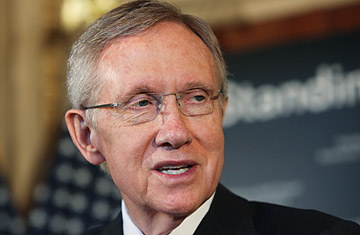
At the end of last summer, after all the heated town-hall meetings on health care reform, Senate majority leader Harry Reid was in a meeting with senior staff in his offices on the second floor of the Senate. He was prepping for an interview when an aide raised a concern about the effect Reid's actions might have on his re-election back home — which wasn't going so well. Reid gazed at his staff sitting in a semi-circle in front of him before answering the question. "Look, everyone, I am who I am, and I'm not going to change ... O.K.?" he barked.
Unfortunately for Reid, being himself was not the popular route. What followed his declaration of independence were seven brutal months on health care during which Reid, already flailing in Nevada polls, sunk to career lows. He became personally attached — sweetheart deals and all — to the legislation that even now, two months after enactment, more than half of Nevadans would like to see repealed. And the mini-tempest that emerged earlier this year when Reid was quoted in the book Game Change saying that President Obama would be a successful candidate because of his "light skinned appearance" and the fact that he had "no Negro dialect unless he wanted to have one," certainly didn't help, though Reid apologized and Obama reemphasized his support for Reid.
But in the last month, things have started to look up for the bloodied one-time professional boxer. Reid finally passed a bill popular with Nevadans: financial regulatory reform. He also convinced the Obama Administration to cut all funding to Yucca Mountain, a controversial project to house spent nuclear fuel in Nevada, a plan detested by locals. With Reid's annual U.S. National Clean Energy Summit approaching this summer, his mantra of renewable fuel sources has been underlined by the oil spill in the Gulf of Mexico. Also popular with Latino voters has been Reid's commitment to take up immigration reform this year. And he's had more time to focus on local issues, working with banks on mortgage relief, a key issue in a state that maintains one of the highest foreclosure rates in the country.
Reid has risen in the polls from lows in the mid-30s in January to the low-40s now, though he still trails all three of his potential opponents. But a silver lining for him has been the disarray in the June 8 GOP primary race. Former Republican State Party chair Sue Lowden, once the front runner for the GOP nomination, has been hurt by a series of missteps. Last month the former beauty queen was widely mocked for suggesting that folks might barter chickens for medical care (she's since tried her best to retract the comments). And she's run into potential trouble with the Federal Election Commission over allegations that a supporter donated a $100,000 luxury RV to her campaign: the limit per person is $2,400 and contributions over $25,000 are technically a felony offense. (Lowden has denied any wrongdoing and insisted that the RV was only leased temporarily.) A recent poll showed Sharron Angle, former state representative and a favorite of the Tea Party groups, beating Lowden. And the third candidate, businessman Danny Tarkanian (son of the famous University of Nevada, Las Vegas, basketball coach Jerry Tarkanian), has also been nibbling away at Lowden's lead. Though she's the establishment darling, Lowden can expect little help from the state's party leaders: both Senator John Ensign and Governor Jim Gibbons are embroiled in sex scandals.
Reid still has a long way to go. He remains unpopular in the state, with his favorable-unfavorable numbers hovering at 38%-56% for over a year. He trails Lowden by an average 10 of points and Tarkanian and Angle by 6 points each. If the election were held today against any of these three, Reid would likely lose.
Reid's campaign hopes that emphasizing his record of delivering for the state — comprehensive health reform, as a Reid adviser put it to me, instead of chickens — will help turn his numbers around. His campaign spokesman Jon Summers bragged that Reid brings home more funding for Nevada projects than the rest of the Nevada congressional delegation combined, equivalent to nearly one-third of the revenues brought in by gambling, the state's largest business. But Reid's biggest challenge is to educate the legions of new voters that have been pouring into Nevada at an estimated rate of 30,000 a month about his 24-year record. He's already spent more than $5.2 million of his hefty $11.3 million war chest (nearly double that of the top four GOP candidates combined), carpet-bombing the state with television and radio ads touting his credentials.
But in a year in which clout has been reviled — look no further than Arlen Specter in Pennsylvania and Bob Bennett in Utah — is running on one's ability to bring home the bacon going to play with Nevada voters? Reid's betting the house on it.
